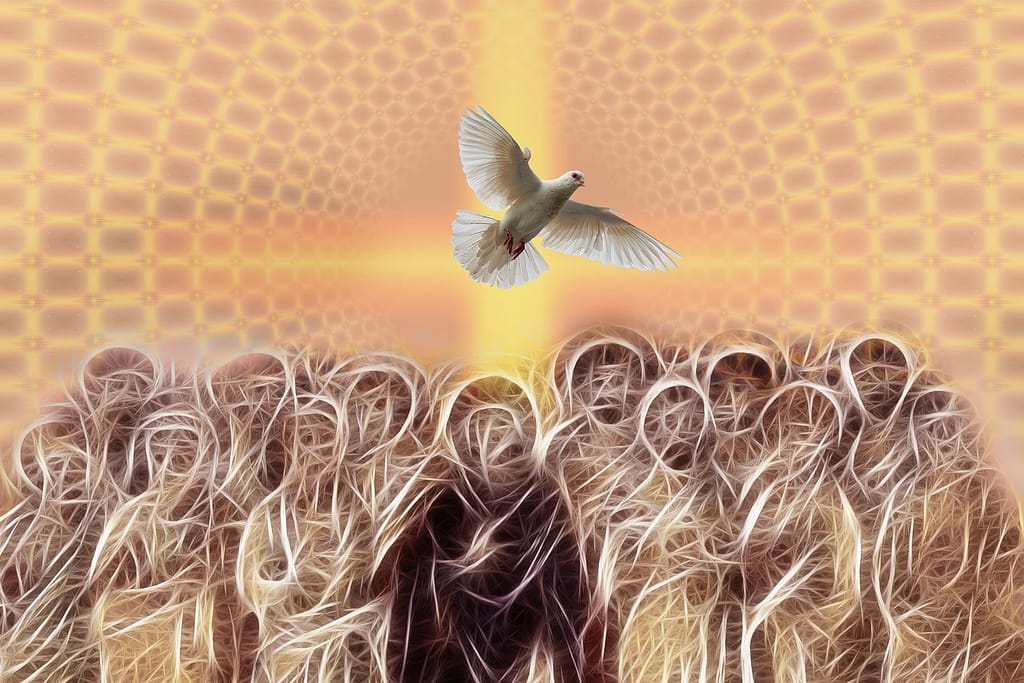One of the most important days in Christian history was the Day of Pentecost when the Holy Spirit appeared to the 120 disciples gathered in the Upper Room.
A momentous encounter ushered in a new era of spiritual empowerment for believers, fulfilling Jesus’ promise to send a Helper.
They saw tongues like fire descend upon them in the form of the Holy Spirit, and they began to speak in various tongues. This potent imagery of fire and tongues symbolizes the Holy Spirit’s purifying and transformative power throughout the New Testament.
This article explores the historical background of this incident, the significance of fire and tongues, and the exhortation to Christians in the present to pursue the flaming baptism of the Holy Spirit.
The Upper Room Experience
- Gathering in the Upper Room: After Jesus’ ascension, His followers obeyed His command to wait in Jerusalem for the promised Holy Spirit. Acts 1:13–15 describes the scene: “When they had entered the city, they went up to the upper room where they were staying; that is, Peter and John and James and Andrew, Philip and Thomas, Bartholomew and Matthew, James the son of Alphaeus, Simon the Zealot, and Judas, the son of James. All with one mind were continually devoting themselves to prayer, along with the women, Mary, the mother of Jesus, and His brothers. At this time, Peter stood up amid the brethren (a gathering of about one hundred and twenty persons was together).”
- The Outpouring of the Holy Spirit: Acts 2:1–4 recounts the extraordinary event on the Day of Pentecost: “When the day of Pentecost had come, they were all together in one place. And suddenly, there came from heaven a noise like a violent rushing wind, and it filled the whole house where they were sitting. And there appeared to them tongues as of fire distributing themselves, and they rested on each one. And they were all filled with the Holy Spirit and began to speak with other tongues, as the Spirit gave them utterance.”
- Peter’s First Gospel Sermon: With the help of the Holy Spirit, Peter stood up and gave a stirring sermon to the crowd. Acts 2:14–18 describes his proclamation: “But Peter, taking his stand with the eleven, raised his voice and declared to them: ‘Men of Judea and all you who live in Jerusalem, let this be known to you and give heed to my words. Given that it is only the third hour of the day, these men are not intoxicated, as you might assume. Rather, the prophet Joel foretold the following: “And it shall be in the last days,” declares God, “That I will pour forth of My Spirit on all mankind; and your sons and your daughters shall prophesy, and your young men shall see visions, and your old men shall dream dreams; even on My bondslaves, both men and women, I will in those days pour forth of My Spirit, And they shall prophesy.”
The Symbolism of Tongues and Fire
The imagery of tongues and fire holds profound significance in the context of the Holy Spirit’s work:
- Tongues: The appearance of tongues of fire resting on each disciple signifies the Holy Spirit’s empowering presence, enabling them to speak various languages. This gift of tongues served as a sign to Jerusalem’s diverse crowd, showcasing the gospel’s universality.
- Communication: Speaking in tongues symbolizes the breaking down of language barriers and the proclamation of God’s works to all nations. This miraculous ability demonstrated that the gospel transcends cultural and linguistic boundaries.
- Fire: Fire is a powerful biblical symbol representing God’s presence, purity, and transformative power.
- Purification: Malachi 3:2–3 describes God as a refiner’s fire, purifying His people: “But who can endure the day of His coming? And who can stand when He appears? He is like a refiner’s fire and a launderer’s soap. He will sit as a refiner and purifier of silver; He will purify the sons of Levi and purge them as gold and silver, that they may offer to the Lord an offering in righteousness.”
- Divine Presence: God shows Himself to Moses in Exodus 3:2 as a burning bush that does not burn down, signifying His eternal and holy presence. Similarly, the tongues of fire at Pentecost signify the indwelling presence of the Holy Spirit within believers.
- Baptism with Fire: John the Baptist prophesied about Jesus’ baptism with the Holy Spirit and fire in Matthew 3:11: “I indeed baptize you with water unto repentance, but He who is coming after me is mightier than I, whose sandals I am not worthy to carry. He will baptize you with the Holy Spirit and fire.”
- Empowerment: The fire of the Holy Spirit empowers believers for ministry and bold witness. As seen in Acts 1:8, Jesus promised: “But you shall receive power when the Holy Spirit has come upon you, and you shall be witnesses to Me in Jerusalem, and in all Judea and Samaria, and to the end of the earth.”
The Lukewarm Laodicean Church
The Book of Revelation contains a stern warning to the church in Laodicea about spiritual lukewarmness, highlighting the importance of maintaining the fire of the Holy Spirit.
- Warning to the Laodicean Church: Revelation 3:15–16 states: “I know your deeds, that you are neither cold nor hot. I wish you were either one or the other! So, because you are lukewarm—neither hot nor cold—I am about to spit you out of my mouth.”
- Zeal Deficit: The Laodicean church receives criticism for its spiritual laziness and lack of zeal, in contrast to the zealousness expected of true believers.
- Call to Repentance: Revelation 3:19 encourages repentance and rekindling of spiritual fervor: “Those whom I love, I rebuke and discipline. So be earnest and repent.”
- Rekindling the Fire: Christians are encouraged to reaffirm their dedication and seek the Holy Spirit’s fervor to rekindle their commitment to God’s work.
The Imperative for Today’s Believers
- Seek the Holy Spirit’s Fiery Baptism: Believers today must seek the baptism of the Holy Spirit with the same fervor as the early disciples. “Practicing this requires dedication to prayer, living a holy life, and being open to the work of the Spirit.”
- Maintain Spiritual Fervor: Avoiding the lukewarmness of the Laodicean church requires continual renewal and dedication to God’s purposes. Romans 12:11 advises: “Never be lacking in zeal, but keep your spiritual fervor, serving the Lord.”
- Embrace the Gifts of the Spirit: Churches should teach and encourage the exercise of spiritual gifts, including speaking in tongues. These gifts are vital for personal edification and corporate strength.
- Live as Witnesses: The Holy Spirit empowers believers to be fearless gospel witnesses. Acts 4:31 describes this audacity: The place they gathered shook after their prayer concluded. The Holy Spirit filled them all, and they fearlessly spoke God’s message.
In summary
One of the most significant events in Christian history was the appearance of the Holy Spirit as tongues of fire on the Day of Pentecost. This fiery baptism empowered the disciples to speak in tongues and boldly proclaim the gospel. The imagery of tongues and fire symbolizes the Holy Spirit’s purifying, empowering presence, a presence that believers today must continually seek.
The warning to the Laodicean church serves as a reminder to maintain spiritual fervor and avoid complacency. By seeking the Holy Spirit’s fiery baptism, embracing spiritual gifts, and living as bold witnesses, believers can experience God’s presence and power. As we strive to keep the fire of the Holy Spirit burning within us, we fulfill our calling as passionate, Spirit-filled children of God.



